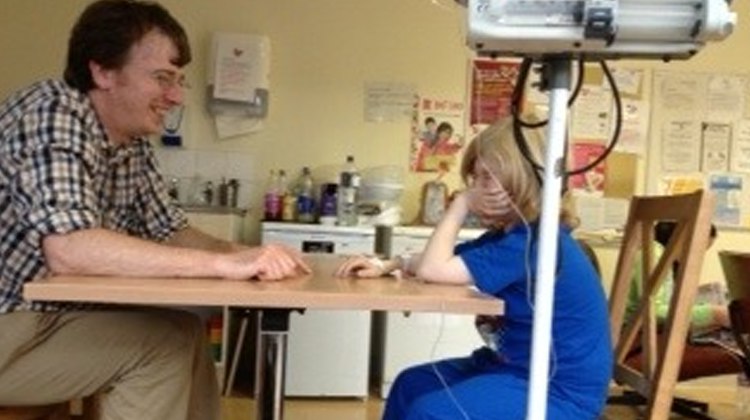‘I’m His Dad Not His Doctor’- David’s Story

Father’s day 2013 was a good day; a good day in a shockingly awful month. Alasdair was well enough to get to the shop at the entrance to St Thomas Hospital and had chosen a card with a groan inducing joke that appealed to his 12 year old sense of humour. We sat in the coffee room and he looked in disbelief as I measured his syringe pump looking for ideas about how I could use a similar model at work. In fact there’s a picture somewhere of us looking with affection and exasperation at each other!
A few days earlier Helen and I had waited in the same coffee room for over 4 hours waiting for Alasdair to come out of the Catheter Lab. There had been complications and Alasdair had developed an unexpected blood clot. He’d woken up in intensive care when he’d been expecting to come straight back to ward and go home the next day. We’d had to explain to him why he would be missing another school trip. Why he needed to master fingerprick blood tests and subcutaneous injections on top of his “normal” bloods and medicines.
It would be another three weeks before we sorted out his clotting levels, dealt with an infection and got back to our normal world, but, on Father’s Day he was himself and out of danger.
What does it mean to be a father to a boy with half a heart and a rare complication? As parents Helen and I had been invited to have “the talk” in the doctor’s office twice. Shortly after he was born in 2000 to hear how serious his heart condition was and how they would be using a surgical technique first used in that hospital 5 years previously. The second chat was also seven years later to hear how serious Protein Losing Enteropathy was as a complication. I found out that the medication he was responding to had been published in the Scientific literature only a few months earlier.
I want to be able to say I’ve done everything I can for Alasdair to have the best health possible. I’m a Medical Physicist, a specialist in scans and treatments using radioactive materials, so “doing everything I can” means using my health researcher skills to find out what is being done in for PLE around the world. Seven years ago, as far as Google was concerned, most of it seemed to be about managing the condition in dogs!
I collected all the literature I could lay my hands on and found out that there were two research groups in America that I wanted to meet and also another Father who had organised a Scientific Conference looking to beat the disease. I made the trip in 2010 getting details of a steroid treatment (budesonide) that had been suggested to the experts by yet another father. A year later Alasdair needed the treatment I’d found out about. Last year after two years on budesonide his protein was falling again and we felt that it was time to try the catheter procedure.
…but I’m his Dad not his doctor. As Helen very wisely said “You can’t live in the doctor’s office”. You can’t just think about prognosis and statistics. I need to understand how his medical team has come to its decisions but I wouldn’t want them to be my decisions. Suzie Hutchinson at Little Hearts helped me to understand that as parents, we might not be in charge but we have to be part of the team.
Anyway it’s Alasdair that has to the real work of managing his condition. He has the blood tests, takes the medicines, catches up with the school work after the hospital appointments. Managing a school trip to a theme park when you are the only one of your friends too short to ride the roller coasters isn’t easy. Trying to get a feeling of achievement in doing a long bike ride when you are being constantly passed by children 8 years younger. These are the real issues that need Dad support and unfortunately Medical Physics training is no help at all!
I hope he understands how proud I am to be Alasdair’s Dad.
Written by David Simpson (2014)